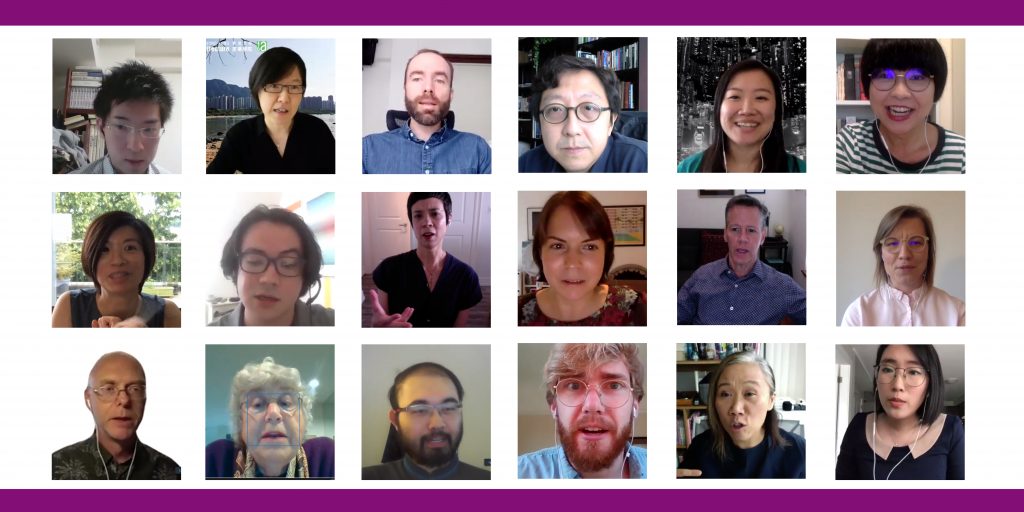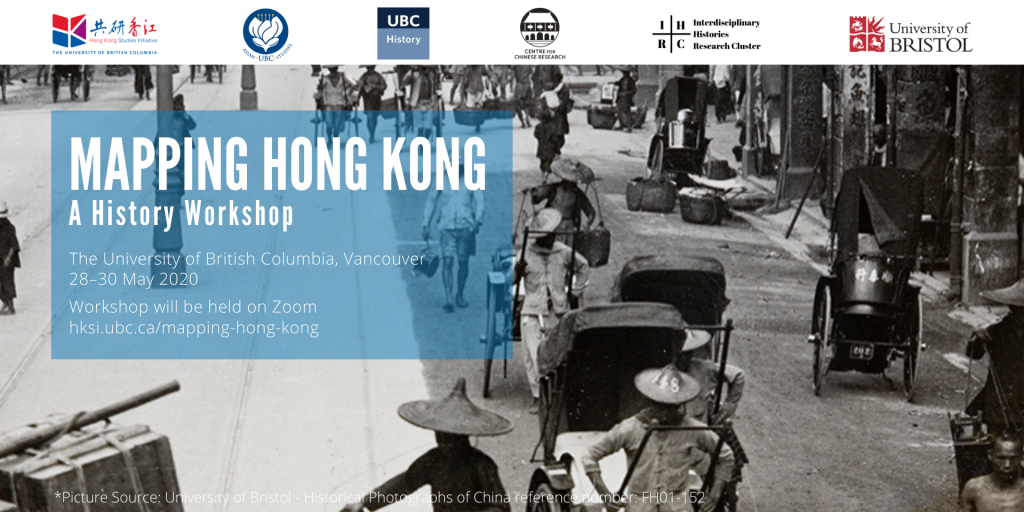The University of British Columbia
28–30 May 2020
[Updated: 2 June 2020]
2020 has not been kind to Hong Kong. Pro-democracy protests, a public health epidemic, and the perceived breakdown of ‘one country, two systems’ dominated international headlines. But these events also underscore the need and urgency for Hong Kong studies as a discipline. Recently, the Hong Kong Studies Initiative at the University of British Columbia hosted a three-day workshop titled: “Mapping Hong Kong—A History Workshop.” Where and how should historians situate Hong Kong’s past? And through what frame does one understand Hong Kong’s history? These themes resonated among the 11 presentations that spoke of Hong Kong in different spaces and temporalities.
As a port-city, Hong Kong became a site of multiethnic communities, which later contributed to questions over identities. Thomas Larkin’s “Slow News and Missed Opportunities: Transnational politics, private interests, and the decline of the old American firms” explored how local American expatriates conceived the US Civil War as a distant conflict that took away from their social engagements in British society. Nadine Attewell’s “An American in Hong Kong: Mapping Intimacy in the Age of Exclusion” charted the intersection between interracial marriage, a racialized legal system, and the construction of Whiteness and Asian-ness through the court case of Sara Hing. Matthew Foreman’s “Chinese Identities in Fin-de-Siecle Hong Kong” charted the public contestations over Eurasian-ness and mixed identities, and how it connected to the development of a narrow Chinese identity. Malgorzata (Gosia) Osinska’s “Searching for the Identity of Hong Kong” offered a examination of how contemporary Hongkongers conceived of Hong Kong’s cityscape.
Hong Kong’s position as a British entrepot connected it to larger networks both internal and external. Shingo Kobori’s “Who got the Control over the Public Health? Municipality, Government Administration and Kai-Fong Committees in Early 20th Century Hong Kong” demonstrated the complexities of cooperation between local British and Chinese elites in times of epidemics. Gemma O’Niell’s “‘The Excitement of the Moment’: 1966 and the Coming of Age of Hong Kong’s Political Awareness” re-centers the 1966 Star Ferry protests as a critical moment for local Hongkongers to begin demanding political and social changes. Yiwen Liu’s “Entangled Empires: Reframing 1970s Hong Kong with the Vietnam War” challenged grand narratives by exploring American sailors’ R&R moments in the colony and presented an alternative story. Ka Lee Wong’s “Transnational ‘Rice Servicing with Television’: Hong Kong Cantonese Pop Culture and its Connections with Singapore and Malaysia” examined Hong Kong’s soft power and cultural capital across communities in Southeast Asia.
The physical site of Hong Kong also occupied an important role in the construction of meanings and how local objects embody new understandings. Helena Wu’s “Between Locality and Local Relations: The Case of Sung Wong Toi” laid out how physical objects are ascribed new ideals. Cecilia Chu and Lachlan Barber’s “RelicStories: Archaeological Heritage and the Reconstruction of Histories in Postcolonial Hong Kong” excavated the city’s layered histories which occupied different times and rulers. Vennes Cheng’s “Historical Detour: Plunge into Artist Archive and Archival Art Practice of Contemporary Hong Kong” raised questions over what archives embody and their relationship with the city.
These presentations showcased a small portion of the new and innovative research currently conducted by historians and scholars of Hong Kong. It energized the organizers in doing their part to further the repository of knowledge about Hong Kong. It gives hope for the future and longevity of Hong Kong studies.
—Ryan Sun, Co-organizer, “Mapping Hong Kong—A History Workshop”

Across 16 time zones, 12 presenters and 6 commentators from Japan, Canada, the U.S., the U.K., Switzerland, Poland, and, of course, Hong Kong were joined by dozens of participants from the world over for a 3-day history workshop on “Mapping Hong Kong.”
The UBC Hong Kong Studies Initiative, in partnership with the Hong Kong History Project at the University of Bristol, is pleased to announce that a modified history workshop will be held via Zoom on May 28–30, 2020.
Registration required (by 5 pm, Tuesday, May 26 PDT)
Schedule
(All times listed are in Pacific Daylight Time)
Session 1 (Thursday, May 28, 18:00)
Who Controlled the Public Health? Municipality, Government Administration and Kai-Fong Committees in Early 20th Century Hong Kong
Shingo Kobori, Kyoto University
RelicStories: Archaeological Heritage and the Reconstruction of Histories in Postcolonial Hong Kong
Cecilia L. Chu, University of Hong Kong
Lachlan Barber, Hong Kong Baptist University
Historical Detour: Plunge into Artist Archive and Archival Art Practice of Contemporary Hong Kong
Vennes Cheng, Chinese University of Hong Kong
Commentators:
John M. Carroll, University of Hong Kong
John D. Wong, University of Hong Kong
Session 2 (Friday, May 29, 10:00)
An American in Hong Kong: Mapping Intimacy in the Age of Exclusion
Nadine Attewell, McMaster University
Chinese Identities in Twentieth-Century Hong Kong
Matthew Foreman, Northwestern University
Commentator:
Robert Bickers, University of Bristol
Session 3 (Friday, May 29, 13:00)
Entangled Empires: Reframing 1970s Hong Kong with the Vietnam War
Yiwen Liu, Simon Fraser University
Transnational “Rice Serving with Television”: Hong Kong Cantonese Pop Culture and its Connection with Singapore and Malaysia
Ka Lee Wong, University of Southern California
Commentator:
Helen Hok-Sze Leung, Simon Fraser University
Session 4 (Saturday, May 30, 09:00)
A Historical Perspective on the Process of Creating Hong Kong’s Identity
Malgorzata Osinska, Jagiellonian University
Sung Wong Toi as Symbol
Helena Wu, University of Zurich
American and British Communities in Hong Kong during the Civil War
Thomas Larkin, University of Bristol
‘The Excitement of the Moment’: 1966 and the Coming of Age of Hong Kong’s Political Awareness
Gemma O’Neill, University of Bristol
Commentators:
Diana Lary, University of British Columbia
Leo K. Shin, University of British Columbia
Registration for: “Mapping Hong Kong—A History Workshop“
Registration for this event is now closed.
Call for Papers [Closed]
The UBC Hong Kong Studies Initiative, in partnership with the Hong Kong History Project at the University of Bristol, is pleased to announce a history workshop to be held at the University of British Columbia, Vancouver, Canada, on May 29–31, 2020.
The theme “Mapping Hong Kong” invites reflections on how Hong Kong’s past could be mapped onto a wide range of historical scales or contexts. Whether it has to do with the lived experiences of particular individuals at certain (critical) moments or the transnational movements of goods, ideas, and people over time and space, a common challenge for historians (of Hong Kong or not) is to place their subject in a proper frame of analysis. But what makes a frame “proper”? And how do we as historians attend to the politics of framing?
We seek original contributions that do, in their different ways, speak to the workshop’s theme. While we are primarily interested in papers that engage historical subjects and questions (and are grounded on historical methods and approaches), we do welcome historically-minded contributions from allied disciplines.
This intensive international workshop is open to all, but preferences will be given to advanced graduate students and early-career scholars who could benefit most from this opportunity to “workshop” a dissertation chapter, a draft journal article, etc.
In addition to presenting their work-in-progress and brainstorming with fellow historians, during their visit participants will also have the opportunity to make use of the excellent library resources available at the University of British Columbia.
Accommodation and most meals will be provided. Travel subsidies for graduate students may be available pending on budget.
Deadline for proposals: February 15
Notification of participants: February 28
Papers (~8,000 words) due: May 8
Interested participants are invited to submit, by February 15, a 250-word abstract, a 1-page CV, and a one-paragraph explanation of how their work-in-progress would benefit from this workshop. Submissions and inquiries (subject line: “2020 history workshop”) should be directed to: Ryan Sun (ryan.sun@alumni.ubc.ca)
The organizers gratefully acknowledge the support of: Department of Asian Studies, Department of History, Centre for Chinese Research, Interdisciplinary Histories Research Cluster, and St. John’s College.
